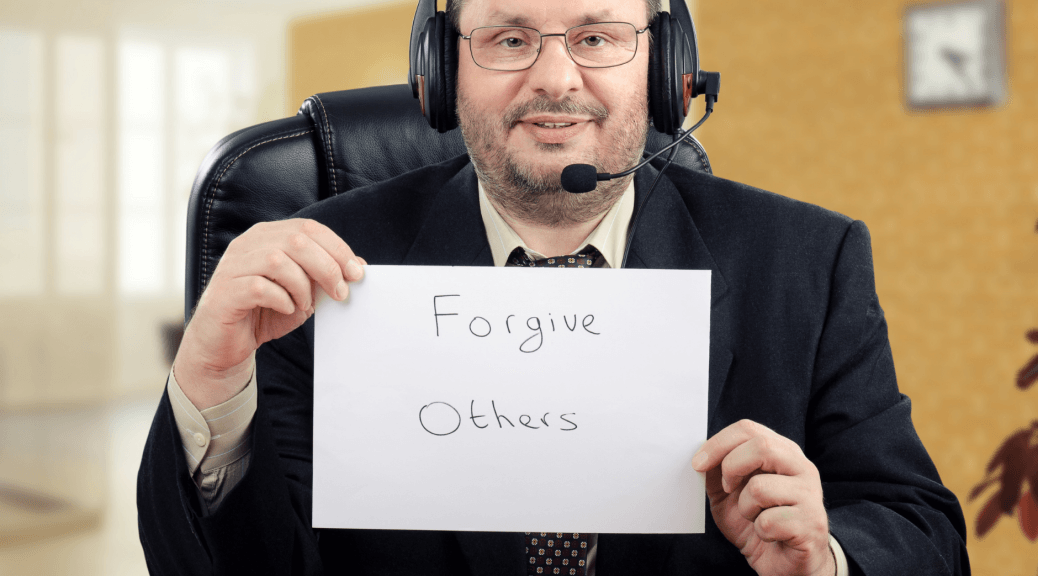
When “Christian Nice” Gets Mean about Forgiveness
A couple of weeks ago I talked about how “Christian Nice” can get (unintentionally) mean about negative emotions. Last week I talked about “Nice” culture tends to enable covert abuse and authoritarian politics. This week I plan to continue those themes by talking about why the use of the word “forgiveness” within “Christian Nice” contexts can be potentially damaging when directed at those who are abused and/or oppressed.
Some Important Definitions
In doing so, I hope to continue our discussion of “god terms” (things to be defended at all costs) and “devil terms” (things to be fought at all costs). I also plan to continue our discussion of halo effects and horns effects—the ideas that when you know one good thing or one bad thing about someone, you presume that a whole web of things about him are good or bad.
Sigh—People Exploit These Things
See, as we’ve discussed, abusers and authoritarian leaders alike often exploit god term/devil term and halo/horns effects to make themselves look good and their enemies and victims to look bad.
And because “Christian Nice” tends to see a (faux) peace as a god term to be defended against those devil-term folks who try to confront these types of manipulators, the gatekeepers of this culture often tend to associate victims and marginalized peoples and their allies as at least faintly immoral if they speak up against abuse and authoritarianism.
“Christian Nice” and Moral Disgust Toward Speaking Up
Let me say that again: the culture of “Nice” trains people to see victims and their allies as faintly immoral and distasteful when they speak truth to power about how they’ve been treated. And that often seeps, through a horns effect, to victims and their allies seeming faintly disgusting overall, whether or not they speak up.
The Call to (Quickly and Universally) Forgive
No wonder there’s often such a quick leap to ask victims and the oppressed to forgive their abusers and/or oppressors. Because the strong emphasis on defending “peace” keeps those with power and voice in their places, the next natural (if unhealthy) step is too often to stay silent—after all, it is, according to “Christian Nice,” the “moral” thing to do.
Other “Christian Nice” folk might even go so far as to “keep the peace”—i.e., defend those hurting and oppressing others. This may come in the form of ignoring the charges to avoid the situation. It may also take the form of bothsidesism, often combined with sin leveling, both of which are really connected and relevant terms related to calls for the oppressed to quickly move to “forgiveness” of abusers.
So let’s quickly define both.
Defining Bothsidesism
Bothsidesism has been coming up a lot in politics lately—it has to do with essentially removing the question of blame by saying that each of two parties or groups have both good and bad people (in seemingly equal proportions)—which usually goes to put more blame than is appropriate on one party and less than appropriate on the other.
The basic issue with bothsidesism, of course, is that power dynamics make it extremely unlikely in most situations that both sides are equally to blame. Bothsidesism specifically moves toward a rhetoric of equality rather than equity and justice.
Bothsidesism and “Reactive Abuse”
In situations of domestic abuse, experts point out that abusers often provoke their victims to the point where they will fight back from survival instinct—and then blame their victims. This happens as much in authoritarian politics as it does in domestic violence and other abuse situations.
Perhaps in light of these types of dynamics you can see why bothsidesism is an issue. (And since the dynamics of domestic abuse and authoritarian demagogues are so similar, this kind of thing applies in all sorts of situations!)
Bothsidesism, Cheap Grace, and Sin-Levelling
The culture of what theologian Dietrich Bonhoeffer called “cheap grace” fits in perfectly with this idea of bothsidesism–which feels like in these calls for forgiveness turns into an issue of “cheap forgiveness.”
We are all sinners, so this logic goes. The problem of course is that whether or not that basic statement is true, that doesn’t mean all situations involve equal weighting of blame, and that we should not carefully consider who is more to blame.
The result of this unhealthy logic is being called, in the emerging research surrounding spiritual abuse, the idea of sin-levelling. Sin-levelling is the idea that because we are all sinners, and all sin, that all sins are equally bad.
Yeah, So I Grew Up with This
I grew up with a LOT of applications of these ideas as applied to the religio-political landscape by the people around me. I had no idea they weren’t healthy. Even with all my communication training, it’s still taken me years to unwrap all of this. (Still working at it!)
Where the Problems Lie From Many Christian Perspectives
The problem, of course, within a Christian context, is that these ideas often contribute overly nicely to the culture of “Nice” I’ve just described, but only by ignoring major themes in the Bible about God always taking the side of the oppressed and looking out for the marginalized and vulnerable.
Let’s Talk about the Horns Effect and How It Affects All This
That said, I’d like to move specifically into the horns effect problem of calls for the abused and oppressed to quickly and universally forgive their abusers.
See, as I pointed out above, the collective devil term/horns effect conflations of very disparate concepts getting lumped together is what makes these statements such a problem, on top of the bothsidesism and sin-levelling issues.
Bothsidesism and sin-levelling are bad on their own. But when these things combine with the Christian Nice idea that confrontation=a devil term, it gets really complicated. In this paradigm, confrontation and anger are both evil and in it together, and also lumped in with aggression and hatred and vindictiveness and rage and all sorts of other unpleasantnesses.
The Effects of the Horns Effect: Victim as “Threat”
No wonder victims and the oppressed would automatically be called to “forgive” if they were seen to be carrying all that kind of threat. (After all, the fear goes, victims are ALWAYS in danger of shifting way beyond coming up on equality—the fear from those used to the status quo is that they will in turn oppress others.)
The tragedy, of course, is that often, if not actually usually, victims are just seeking a little equality and accountability.
Things do sometimes get overblown, and victims CAN sometimes become abusers.
Powerful Abusers Trying to Claim Victim
But as abuse counseling expert Lundy Bancroft has found in his work with abusers (see his book Why Does He Do That!), when someone who was traumatized abuses someone else, their abusiveness is usually a problem distinct from the trauma problem itself, and the trauma may at least partly explain, but certainly doesn’t excuse, the unhealthy behavior.
All that said, it’s important to note that powerful abusers often use–or even inflate, or manufacture–any trauma in their background to excuse their abusive behavior. This is part of a pattern by which those with power too often try to exploit empathy from others–often also called the unhealthy “Viking vs. Victim” phenomenon.
A Cluster of Potential Issues with Calls to “Cheap Forgiveness”
So there’s actually a whole cluster of problems with calls to forgiveness offered indiscriminately. Here are just a few of these issues:
- Because of bothsidesism and sin-levelling as well as the assumption that confrontation is a devil term, these calls too often impute too much “immorality” to victims while defending abusers/bullies/oppressors.
- Because of the “Nice” devil-term horns effect around confrontation/hatefulness/aggression/anger, too often the assumption is that all victims are not just hurt but vindictive and likely to be aggressive (which isn’t always true, by a long shot).
- Because of the power dynamics in bullying, abuse, and oppression, it is very often the fact that one party or group is working to provoke the other party or group—which means that any actual aggression/vindictiveness, etc. coming from the victim/oppressed side is likely to be reactive in nature rather than an ongoing pattern of some sort of ongoing problem or character flaw in the victim. Often this kind of issue shifts when the person is removed from their abuser, any systemic factors relieved (sigh! that one’s hard!) and especially is given trauma therapy to heal.
- Surface level views of forgiveness often partake in the “stuff it down” schools of emotion for devil term/horns effect “negative emotions,” which can further harm the victim. I talked about this more in-depth previously.
- Considering that anger is one of the recognized stages of grief as well as a healthy emotion that can easily exist side by side with “god term” emotions like compassion and empathy, these god term/halo effect and devil term/horns effect conflations can be extremely harmful to allowing for the procedures that facilitate actual healing.
IMPORTANT NOTES:
I know that some victims find forgiveness an important part of their healing process, and I’m certainly not saying we don’t need it in the world for all sorts of ordinary situations, especially.
While this particular complex of issues happens in Christianity in this particular way, a lot of the components of it happen in all cultures of “Niceness” and “rationality.”
But yeah, for the type of victim/oppressed person who already feels too much empathy for their abuser, forgiveness may not be necessary for either their emotional or spiritual healing and well being. In psychology, healing procedures are often referred to as integration or, in grief studies, acceptance. These procedures don’t always have to include forgiveness in either the theological or the general sense.
And for a victim/survivor that’s never been allowed to feel anger for fear of that devil term/horns effect cluster? Well, they probably need to be allowed to access that anger of theirs in order to safely heal.
Moving Forward
Well, I could go on, but hopefully this has been a helpful unpacking of why we ought not be too-easily asking victims/survivors/those healing from abuse and oppression, up to and including the recent victims of mass shootings, to jump immediately to “forgiving” those who have hurt them.
Instead, I would argue, we need to work harder to break up these complex networks of unhealthy concepts before we do. And instead, break through the bonds of “Christian Nice” to speak up against the toxic crap.
Need more resources to do that?
Sign up for our email newsletter and confirm your email address and you’ll receive the “Assertive Spirituality Guide to Trolls,” which will help you understand more of how the visceral responses behind conflict work, both online and off. You can unsubscribe at any time, but I hope you’ll stick around.
A Final Encouragement
Go team #AssertiveSpirituality! Let’s keep doing what we can where we are with what we’ve got to speak up against the toxic crap and move toward a healthier world for us all. We can do this thing.


5 thoughts on “When “Christian Nice” Gets Mean about Forgiveness”
I, too, grew up in an environment where Christian Nice was prevalent. In addition, I was given the message to be silent because good young ladies don’t speak up. It took years of therapy for me to find my voice. I grew up in the South and then moved to the North in 2000, only to move back South in 2011. While in the North, I found that the culture was more accepting of my new found assertiveness than when I lived in the South either before, and especially after, my Northern living experience. Nonetheless, in some way, I believe that my ramblings fit with the paradigm you have presented in your articles.
Absolutely! Thanks so much for sharing your story and for hanging out here. It’s *such* a cultural thing, which is why it gets especially weird when it gets so wrapped up with spirituality. I’d heard it was similar but with a different dialect in the South than what I experienced in the Midwest–thanks for the confirmation!
I thought you’d appreciate a recent article from Christianity Today connected to the sin of niceness: https://www.christianitytoday.com/women/2019/august/virtue-vice-why-niceness-weakens-our-witness.html?
Thanks so much, Brenda!
I love this, thank you. As one who has been abused being raised in a dysfunctional family, Christian background that didn’t match, I could not reconcile so many contradictions. Became a walking contradiction myself. I appreciate learning to think more logically as it undoes the incorrect thinking patterns that I learned and helps me heal or balance both hemispheres even more so, lol. Correct the mind and all else follows, I think is the quote from Lao Tzu.